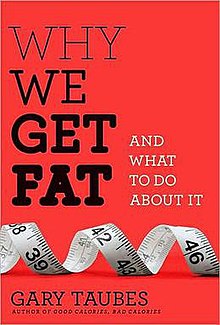Why We Get Fat: And What to Do About It
 |
|
| Author | Gary Taubes |
|---|---|
| Country | United States |
| Language | English |
| Subject | Obesity |
| Publisher | Alfred A. Knopf |
|
Publication date
|
December 2010 |
| Media type | Hardcover |
| Pages | 272 |
| ISBN | |
| 613.712 | |
| Preceded by | Good Calories, Bad Calories |
Why We Get Fat: And What To Do About It is a 2010 book by science writer Gary Taubes. Following Taubes’s 2007 book Good Calories, Bad Calories, in which he argues that the modern diet’s inclusion of too many refined carbohydrates is a primary contributor to the obesity epidemic, he elaborates in Why We Get Fat on how people can change their diets.
Analyzing anthropological evidence and modern scientific literature, Taubes contends that the common “calories in, calories out” model of why we get fat is overly simplistic and misleading because it ignores the multiple complex physiological responses to different foods. It is a more powerful issue than just the calories which would be released as heat by burning the food in a lab calorimeter. Instead, Taubes notes the advantages of a low carbohydrate diet. He argues that the consumption of carbohydrates drives the body to release insulin, which in turn can lead to insulin resistance (and diabetes) over time. Taubes also asserts that the consumption of carbohydrates leads the body to store excess energy in fat cells, but that reducing dietary intake of carbohydrates results in the body entering ketosis. In this state, the body breaks down fat (triglycerides) in order to fuel the brain.
Taubes states in the book that it's not about fat people eating too much and exercising too little or skinny people eating well and exercising a lot. In hunter-gather time periods, humans' lives were spent finding food so when they found a surplus the human body would go into storage mode. Today we don't have the problem of finding food yet our body is still set up to eat as much as possible and store as much as possible for famine times. This leads to excess weight to be put on. Taubes compares getting fat to smoking cigarettes: "Not every long-term smoker gets lung cancer — in fact, only a minority do — but among people with lung cancer, smoking is by far the most common cause. In a world without cigarettes, lung cancer would be a rare disease, as it once was," he writes. "In a world without carbohydrate-rich diets, obesity would be a rare condition as well."
Although Taubes points out his beliefs regarding consumption of carbohydrates, he clarifies by saying, “this is not a diet book, because it’s not a diet we’re discussing, this is a way of life."
...
Wikipedia
